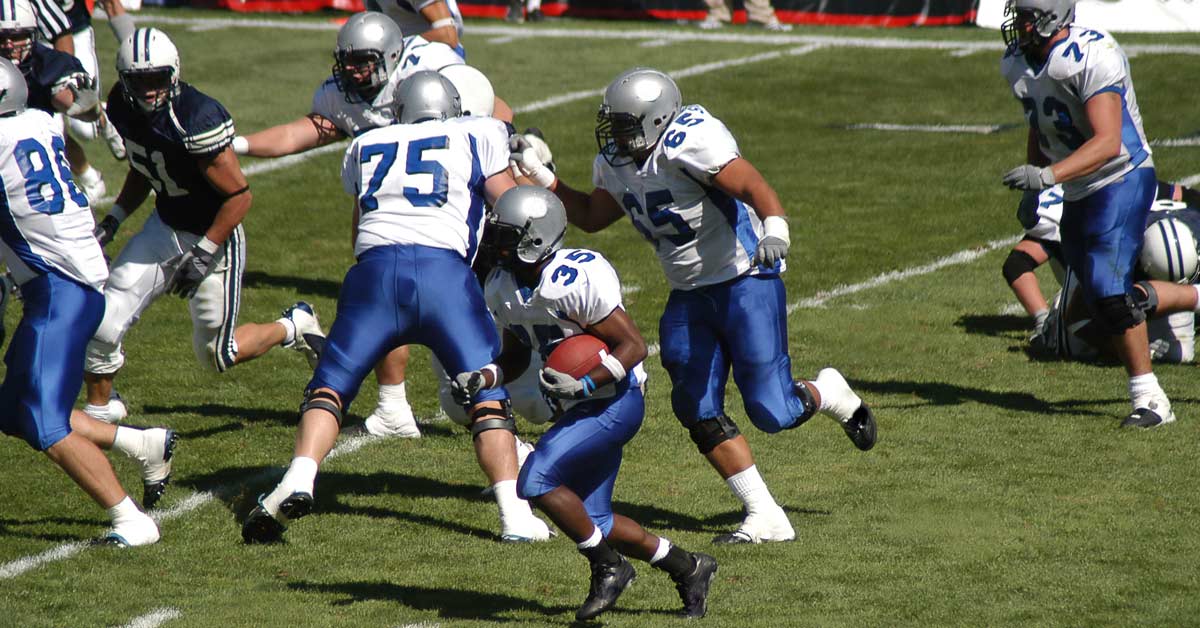
Speed is a top priority in football and many other field and court sports. Football coaches love speed in all its forms—gap-to-gap, sideline-to-sideline, endzone-to-endzone, and everywhere in between. Even so, many coaches still treat game-changing speed as a genetic trait rather than a developed skill. Why do some football coaches recruit speed only to then neglect it? Identifying speed and training speed are two very different things. And developing speed is not the same as developing strength and conditioning.
Bear Bryant said it best, Luck follows speed. Anyone who coaches modern football with old-school methods should consider attending the Track Football Consortium(TFC) this year in Chicago December 7-8 and in Tampa Dec 14-15. Modern football is a game played at breakneck speed. Where football players of the past were big and bulky and wore big, bulky pads, today sprinters dominate football games wearing tights and almost undetectable shoulder pads.
Speed is the key to modern football, but too many football practices look more like boot camp than track practice. If “playing fast” is your mantra, speed considerations should be the lynchpin of weekly practice. Why are some high school football players faster on Monday than Friday? Practice is a grind. Football coaches demand full speed on every rep, every day. If you’re a football coach whose team is faster on Friday, I want to meet you.
“Too often, I see coaches overemphasizing conditioning during the offseason and never developing absolute capacities of strength, power, and speed. In particular, a common mistake is to attack repeat sprint ability when you have never truly developed speed and thus sprint ability itself.”—Josh Bonhotal (Purdue Basketball, TFC-4)
From Track to Field
Now, does this mean all track coaches understand speed development? I don’t think so. Like their counterparts on the gridiron, too many track coaches are addicted to lengthy practices with heavy emphasis on strength, conditioning, and general fitness. The same coaches are fearful of max-speed sprinting in practice. Some track programs never spike-up and sprint—they just run and run and run.
This may be due in part to many track programs having a distance coach at the helm. Sprinters are often seen as soft and lazy because they require so much rest and recovery to grow faster. Daily practice and consistent hard work are keys to distance running, and many coaches make the mistake of holding sprinters to the same standard as distance runners.
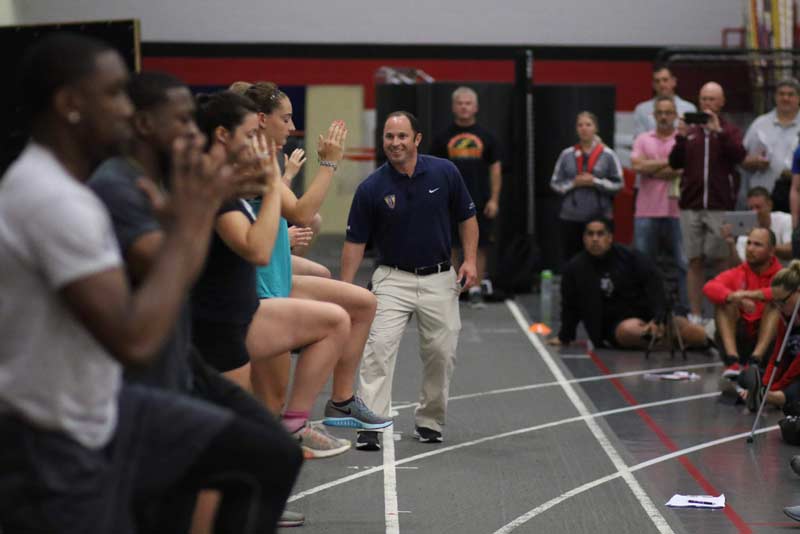
Don’t even get me started on the typical weight room program. Arbitrary lifts. Arbitrary sets and reps. Always chasing infinite strength gains. Many in the weight room don’t seem to understand the difference between bodybuilding and speed development.
Why don’t coaches respect speed development properly? Too many coaches are addicted to the process. When process trumps content, performance suffers. What’s more important: ten hours of terrific football practice or an amazing game on Friday night? It’s the content (the performance) that matters most, not the process. There’s no magic in ten hours of practice. Content must drive the process.
Speed is a coordinated skill to train from day one. Rule #1: never do speed training in a state of fatigue. I believe, however, that the majority of football players practice in a constant state of fatigue; too many sprinters have the same experience in track. This extends even further, as speed is not only the domain of football and track athletes. All athletes benefit from speed, and speed gains correlate with the improvement of other athletic skills.
“Music has been a part of formal education for hundreds of years. Playing the piano or violin makes people smarter. Sprinting is to the athlete what music is to the brain.”—“Basketball Advice from a Sprint Coach” by Tony Holler
Roots of the Track Football Consortium
I love the definition of consortium: An alliance, partnership, or coalition of people pooling resources for a common goal.
That’s it! That’s what our consortium is all about. Our common goal? Speed. The entire idea behind the Track Football Consortium is to share a range of insights about sprinting as a skill instead of a chromosome designated at birth.
No one goes out and recruits strong kids anymore. Strong and fast, yes. Strong and slow, no.
Identifying speed and training speed are two very different things, says @pntrack. Share on XIdentifying speed and training speed are two very different things. Recruiting fast kids should be the number one goal for football and track coaches. However, once you get fast kids, what are you going to do with them? Chris Korfist and I are speed coaches seven days a week. Our lives have become a quest to improve this skill that has been a part of the human experience since ancient times. Both Chris and I have deep roots in football.
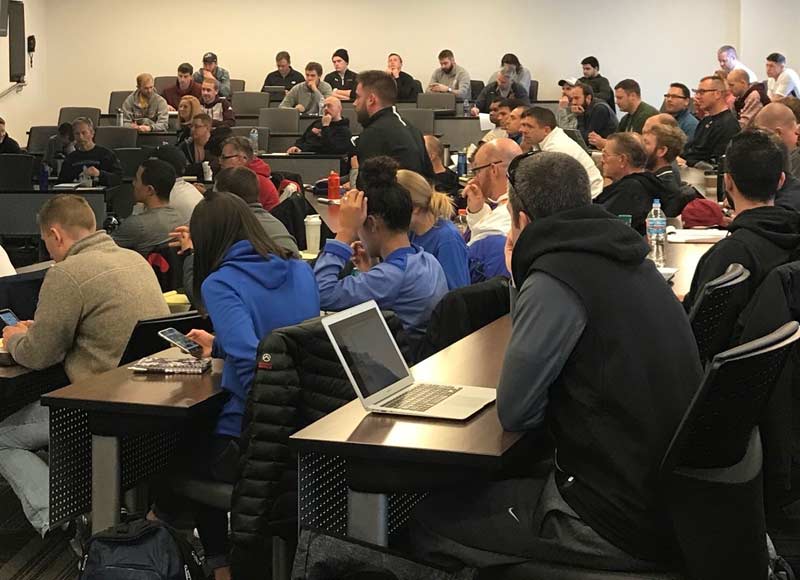
Without question, the Track Football Consortium is unlike any clinic you’ve ever attended. Our core speakers include football coach Dan Fichter of Irondequoit, NY, Chris Korfist and Tony Holler of the Chicago area, and Cal Dietz of the University of Minnesota.
TFC Expanding to Tampa
This year we’re offering our first-ever TFC on the road. On Dec 14 and 15, Carrollwood Day School in Tampa will host the Track Football Consortium. Our lineup is impressive. Core speakers Chris Korfist, Dan Fichter, and Tony Holler will all be there. December will be the first time Feed the Cats from Tony Holler is presented in Florida.
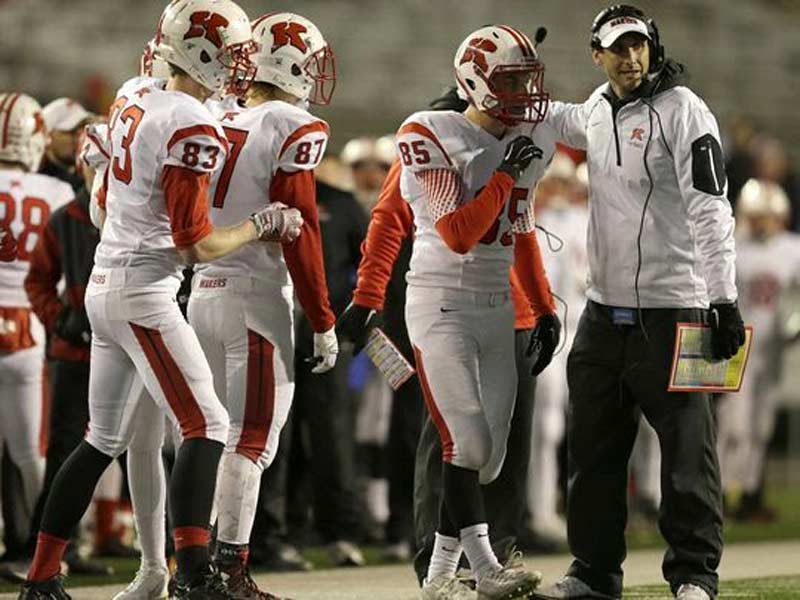
Steve Jones of Kimberly High School in Wisconsin will speak. Coach Jones had his 70-game win streak snapped in the opener this year. Since then, a new streak has begun. Steve has now won 79 of his last 80 games.
Jacksonville University’s Ron Grigg, one of the most respected track coaches in the country, will also present, as will Al Leslie, the head track coach at Saline High School, Michigan. Al was named the 2018 National High School Track and Field Coach of the Year by USA Today.
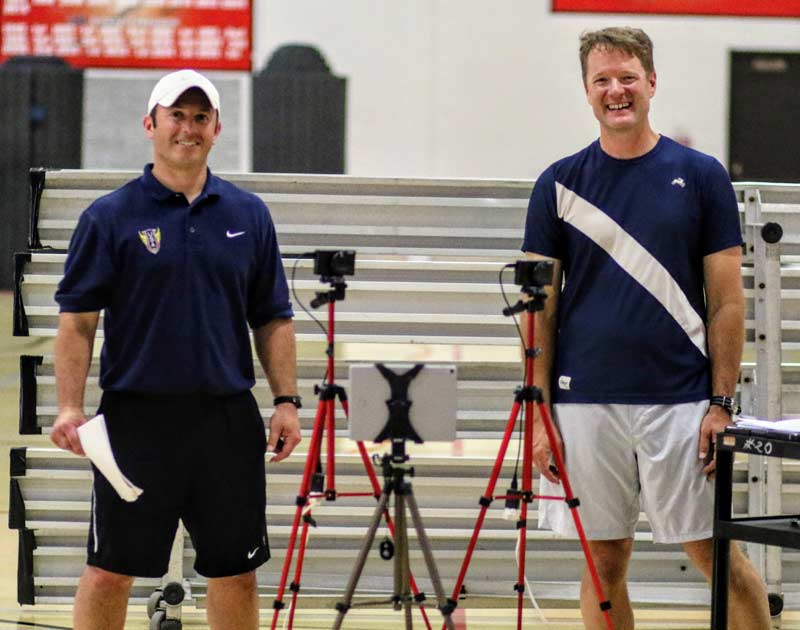
Dr. Ken Clark, who was phenomenal at TFC-7 last June, will also join us in Tampa. For a full list of speakers and topics, visit the TFC-Tampa web page. Those considering attending TFC-Chicago on Dec 7-8 can find information on the TFC-Chicago web page. The Chicago clinic will feature Gabe Sanders of Stanford University.
We’ve had seven previous consortiums featuring some uniquely great speakers. Carl Lewis was our keynote speaker at TFC-6. Stuart McMillan of ALTIS spoke at TFC-4. Strength and conditioning legend Jimmy Radcliffe of Oregon spoke at TFC-5. Dr. Ken Clark, one of the world’s top sprint scientists, spoke at TFC-7. Latif Thomas, CEO of Complete Track and Field spoke at TFC-2. At TFC-7, we attracted an audience of 250 including coaches from 22 states and two foreign countries.
Since you’re here…
…we have a small favor to ask. More people are reading SimpliFaster than ever, and each week we bring you compelling content from coaches, sport scientists, and physiotherapists who are devoted to building better athletes. Please take a moment to share the articles on social media, engage the authors with questions and comments below, and link to articles when appropriate if you have a blog or participate on forums of related topics. — SF


Great article Tony. I think many football coaches unfortunately think general conditioning takes care of speed in some way. The endurance gains coaches produce from boot camp appearing “conditioning” lasts at most two weeks as the ATP-producing mitochondria (the source of endurance) goes back to baseline very quickly. This type of conditioning should be called “aerobic conditioning” versus “anaerobic conditioning” that is needed for football since it is a repeated, short-sprint sport. Running slow is counter productive, and sprinting after practice when athletes are fatigued, and thinking this is positive, is not positive at all. To the contrary, it simply trains the brain to sprint with sloppy technique.
Bear Bryant didn’t say “Luck follows speed”…Frank Broyles did…
https://www.si.com/vault/1965/11/08/607411/the-man-for-the-next-few-seasons
Bryant was a great coach…but he gets credit for all sorts of things he doesn’t deserve. This is just another example of that.